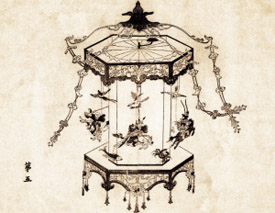CHIN 3173: Chinese Drama and Theatre
Course Description
This is a multimedia-enhanced course, which introduces students to the dramas and theatrical genres of China in both their traditional and contemporary iterations. The course presupposes little or no knowledge of the Chinese language, culture, or history.
Students will be introduced to the history of Chinese theatre, the aesthetics of theatrical performances, as well as works of representative playwrights in major dramatic genres. The historical and cultural background will be presented in chronological order, allowing students to develop an in-depth understanding of major literary and aesthetic trends.
Class work includes lectures or presentations by the instructor but emphasizes student participation through means such as guided discussions, student-led class discussions, and skits and oral presentations. Through individual and collaborative analytical exercises, students will become familiar with a number of critical terms used in literary analysis and develop the skills to interpret the major features of Chinese drama and theatre.
Required Readings
Chinese Theater: From Its Origins to the Present Day. Colin MacKerras, Editor. Honolulu: University of Hawaii Press, 1983. ISBN: 0824812204.
The Stagecraft of Peking Opera: From Its Origins to the Present Day. By Pan Xiafeng. Beijing: New World Press, 1995. (Available from Cheng & Tsui in Boston.) ISBN: 0614161827.
Six Yuan Plays. By Jung-En Liu (Translator). New York: Penguin USA, 1972. ISBN: 0140442626.
Scenes for Mandarins: The Elite Theater of the Ming. (Translations from the Asian Classics.) By Cyril Birch (Translator). New York: Columbia University Press, 1995. ISBN: 0231102623.
The Story of the Western Wing. By Shifu Wang; Stephen H. West and Wilt L. Idema Translators. Berkeley: University of California Press, 1995. ISBN: 0520201841.
The Peony Pavilion (Mudan Ting). By Hsien-Tsu T'ang; Translated by Cyril Birch. Bloomington: Indiana University Press, 1980. ISBN: 0253357233.
The Columbia Anthology of Modern Chinese Drama. Ed. Xiaomei Chen. NY: Columbia UP, 2010. ISBN: 9780231145701.
Crump, James I. "The Conventions and Craft of Yuan Drama," Journal of the American Oriental Society 91.1 (1971), 14-29; rpt. Studies in Chinese Literary Genres, ed. Birch, pp. 192-219. (Blackboard)
Wolff, Ernst. "Law Court Scenes in the Yuan Drama," Monumenta Serica 29 (1970-71), 193-205. (Blackboard)
Yü Shiao-ling. "Taoist Themes in Yüan Drama," Journal of Chinese Philosophy (Special Issue: Taoism in Chinese Literature, ed. Hsin-sheng C. Kao) (Blackboard)
Birch, Cyril. “A Comparative View of Dramatic Romance: The Winter’s Tale and The Peony Pavilion,” in Interpreting Culture Through Translation. Edited by Roger T. Ames et al., pp. 59-77. Hong Kong: Chinese University Press, 1991. (Blackboard)
Dorothy Ko. “The Enchantment of Love in The Peony Pavilion.” In Teachers of the Inner Chambers: Women and Culture in Seventeenth-Century China, pp. 68-115. Stanford, CA: Stanford UP, 1994. (Blackboard)
Idema, Wilt L. “Satire and Allegory in All Keys and Modes.” In China Under the Jurchen Rule. Edited by Hoyt C. Tillman and Stephen H. West, pp. 238-80. Albany: State University of New York Press, 1995. (Blackboard)
Dolby, William. “Wang Shifu’s Influence and Reputation.” Ming Qing Yanjiu 3 (1994): 19-45.
Other readings will be available online (as PDF files or HTML files) through the course website on Blackboard. You need to access the texts well in advance in case there are problems with the website.Films and multimedia materials will be on course reserve.
Recommended
Acting the Right Part: Political Theater and Popular Drama in Contemporary China. By Xiaomei Chen. Honolulu: University of Hawai’i Press, 2002. ISBN: 978-0824824839.
Drama Kings: Players and Publics in the Re-creation of Peking Opera, 1870-1937. By Joshua Goldstein. Berkeley: Univ. of California Press, 2007. ISBN: 9780520247529.
Chinese Shakespeares: Two Centuries of Cultural Exchange. By Alexander C. Y. Huang. NY: Columbia UP, 2009. ISBN: 9780231148498.
Schedule
1/17 Overview
1/19 The origin of Chinese drama. Read Six Yuan Plays, "Introduction"; and Colin MacKerras, Chinese Theater: From Its Origins to the Present Day
1/24 The northern drama and features of Yuan zaju drama. Read The Orphan of Chao
1/26 The musical organization of zaju. Read The Orphan of Chao. Group presentation 1
1/31 Thematic categories of zaju. Read The Soul of Ch'ien-nü Leaves Her Body; Crump, James I. "The Conventions and Craft of Yuan Drama"
Group performance 1
2/2 The performance of zaju. Read The Soul of Ch'ien-nü Leaves Her Body
Group presentation 2
2/7 Quiz 1. Group performance 2
2/9 The Injustice Doen to Tou Ngo
Group presentation 3
2/14 Chang Boils the Sea
Group performance 3
2/16 Chang Boils the Sea
Group presentation 4
2/21 Quiz 2; The aesthetic feature of xiqu. Read Master Tung's Western Chamber Romance
2/23 The "In all keys and modes" (zhugongdiao). Read Master Tung's Western Chamber Romance
Group performance 4
2/28 Story of the Western Wing
Group presentation 5
3/1 Story of the Western Wing. Group performance 5.
3/6 Story of the Western Wing. Group presentation 6.
3/8 Mid-term exam
3/13 Spring Break
3/15 Spring Break
3/20 Story of the Western Wing
Mid-term paper due
3/22 Quiz 3
3/27 The Peony Pavilion. Group performance 6
3/29 The Peony Pavilion and female readers' self-perception. Group performance 7
4/3 The Nationalization of Beijing Opera. Read The Peony Pavilion; and Dorothy Ko, Teachers of the Inner Chambers, Chapter 2
4/5 Quiz 4. Mei Lanfang and the Beijing Opera. Read Joshua Goldstein, Drama King and Pan Xiafeng, The Stagecraft of Peking Opera: From Its Origins to the Present Day
4/10 Film and Discussion: Farewell My Concubine. Read Pan Xiafeng, The Stagecraft of Peking Opera
Group presentation 7
Final paper draft due
4/12 Modern Chinese drama; huaju spoken drama. Read Cao Yu's Thunderstorm and Chen's "Introduction" to The Columbia Anthology of Modern Chinese Drama
4/17 Cultural Revolution and the eight "model operas." Read Chen's Acting the Right Part and The Red Lantern (hongdeng ji)
4/19 The Red Lantern
4/24 Quiz 5. Intercultural theatre and Beyond. Wu Hsing-Kuo’s Lear is Here (video on Global Shakespeares). Read Huang's Chinese Shakespeares, chapter 7.
4/26 Intercultural theatre and Beyond. Read Gao Xingjian's Snow in August (on Blackboard). Read Huang's "The Theatricality of Religious Rhetoric: Gao Xingjian and the Meaning of Exile." Theatre Journal 63.3 (2011): 365-379.
5/4 Final Paper due

